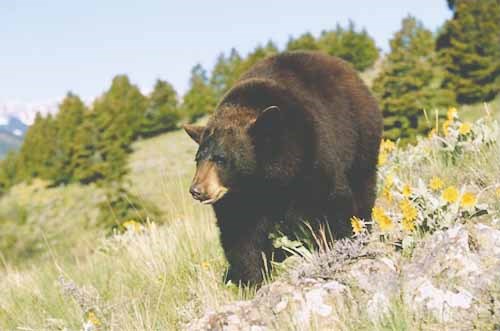The woman didn't see the bear until it was too late. She had been hiking alone on the Nut Point Trail at the north end of Downton Lake in Lac La Ronge Provincial Park when she encountered a bear that had done substantial damage to a cabin, and had no interest in leaving the immediate area.
Fearing for her safety, the hiker tried to get into the cabin, but she couldn't. So she climbed onto the roof, where she used her cellphone to contact a friend in La Ronge who, in turn, contacted a conservation office with the Saskatchewan Ministry of Environment.
That encounter in May of this year ended without incident, but it could have very easily had a more unfortunate outcome-and it underscores how quickly bear encounters can escalate into dangerous situations.
With 34 provincial parks across Saskatchewan, campers are privileged with plenty of beautiful and scenic spots to enjoy nature. However, several of these parks attract bears as well as humans, making proper food storage, cooking methods and garbage handling essential for safe camping.
"Many of the provincial park campgrounds are in the heart of bear country and it's important that campers are aware of activities that will attract these large animals" says Conservation Officer Gary Provencher.
Heading into the height of camping season, the Ministry of Environment would like to stress the importance of bear awareness.
"Black bears are omnivores, and will scavenge, which mean they will investigate anything that looks like a potential meal," explains Provencher. "They can often be found feeding in garbage dumps and other areas where they can find food scraps left over from humans, which can sometimes cause problems."
Attractants are items that may entice wildlife, including coolers, food, garbage, wrappers, dishes, pots, pet food, bowls, bottles, cans, and any other item associated with food preparation, dish washing, or food storage.
"Bears become habituated when these attractants are continually available, and this creates an unpredictable, dangerous situation for the public," warns Provencher.
Campers can be charged and evicted for leaving attractants in their campsite.
To avoid bear conflicts in a campground, never cook or eat in a tent. Campers should store food in air-tight containers in the trunk of their vehicles, not in tents or tent-trailers. All garbage should be placed in the containers provided, and fish should only be cleaned at designated fish-cleaning stations.
Campers should pitch their tents in the open, away from dense bush, streams, and game trails. They should also stay on trails and make noise as they walk by talking or singing to warn bears of their presence.
"Never feed or approach a bear or cubs," says Provencher. "If you suddenly encounter a bear, calmly back away, speak in low tones, and don't look directly at the bear."
It is unlawful to feed bears on park land.
Bears that have been fed lose their natural fear of humans. When bears start to associate their food with humans, they become a nuisance and often end up having to be put down.
Campers should not let themselves be the cause of a bear's destruction!
Contact the park entry gate office or call 1-800-667-7561 (TIP) or 1-800-667-1788 (Park Watch) to report any bears observed in the campground.




